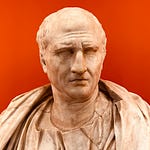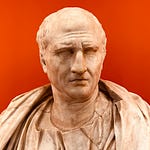“Attachment to many things weighs and drags us down. That’s why, if the weather stops us from setting sail, we sit and fume, constantly peering outside: ‘Which direction is the wind from?’ ‘The north.’ ‘Damn! When is it going to blow from the west?’ In its own good time, my friend.
“So what must we do? Make the best of what’s up to us and take everything else as it comes.
“So what resources do we need to have at hand for circumstances like these? Just the knowledge of what is and isn’t mine, and of what is and isn’t possible for me.
I am condemned to death. Do I have to die moaning and groaning as well?
To incarceration. Do I have to complain about it?
To exile. Is there anyone stopping me from going with a smile, joyful and content?
‘Divulge your secrets.’ I refuse, because that’s something that’s up to me.
‘I’ll clap you in irons.’ What are you talking about, man? Me? You’ll shackle my leg, but not even Zeus can conquer my will.
‘I’ll throw you in prison.’ My body.
‘I’ll cut off your head.’ Well, have you ever heard me suggest that I’m unique in having a non-detachable head?
These are the ideas to which people who take up philosophy should apply themselves, which they should write about every day, and in which they should train themselves.” (Epictetus, Discourses I.1.15-25)














Epictetus on how to react to events